Pharos Read online
Page 22
The worst of it was that the machine would not even enjoy the act should it succeed. There was something incredibly disheartening about fighting unthinking machines.
A fresh line of Night Lords prepared to charge up the incline.
The war construct was one of two blocking strategic entrances to the mountain, both massive Thanatar-Calix class Castellax automata. Krukesh had given Skraivok’s company the dubious honour of taking one of them down. ‘Theirs’ stood a little way back in the tunnel, the entrance plugged with a uni-directional energy shield that allowed it to fire outwards, but did not permit fire in. The shield sparkled out a sheet of silver as bolt-rounds smacked into it. In response the automaton swung its massive arm around, mauler cannon blazing.
A Night Lord was hit full in the chest. The machine’s bolt-cannon was loaded with some kind of exotic incendiary ammunition, and bright light burned from every joint in the victim’s armour. His lenses burst outwards as jets of fire shot from his skull. Shattered metal glowing red with heat clattered to the ground, igniting what little vegetation remained as it scattered itself down the mountainside.
A large-calibre round whined over Skraivok’s head. Where that was going to land was anyone’s guess.
‘Any news from Twenty-Third Company?’ he muttered to Gallivar.
‘Negative, claw master. Their Claws Three through Ten have run into significant Legion resistance in the lower halls. Claw Twelve has disappeared, no more contact.’
‘Our warriors go in and do not return. The paths are not safe,’ said Karrig Vorsh.
‘I thank you for your startling strategic insights, brother.’
‘I seek to fulfil my role, claw master, as your humble advisor,’ said Vorsh.
‘What of the Seventh? Where is Gesh?’
Gallivar adjusted his nuncio-vox. With the extended array on his backpack, he was the bigger target of the three of them and so had the safest spot in the hollow. Standard vox wasn’t powerful enough to cut through the beacon’s interference field even at such short ranges. If Skraivok didn’t need him and his nuncio so much, he’d have ordered him to exchange places.
‘The Seventh Company are in the same situation, my lord. They cannot get through the energy field of the second construct. They are suffering heavy casualties.’
‘We should have got through by now,’ said Skraivok. A run of depressing outcomes crowded his mind.
‘I have been watching, and I do not believe this is a standard Thanatar energy matrix,’ said Vorsh. ‘It is a static field, perhaps a standard excavation bracing field, turned on its side. It is a match for any static shielding, in the right circumstances.’
‘Did I mention my thanks earlier?’
‘They’re not mobile,’ continued Vorsh, ignoring both the content and tone of his commander’s words. ‘The machine cannot get out.’
‘While we cannot get in!’ Skraivok closed his hand around a fistful of blackened soil. ‘Send in another three claws, we will attempt the cave one more time.’
‘We will still have to get through the machine’s atomantic projector, if we bring down the bracing field,’ warned Vorsh.
Skraivok cursed fluidly in basest Nostraman gutter talk. ‘There must be a way around these mechanical bastards.’
Puffs of dust and rock chips burst from the ground in front of the hollow. Skraivok pressed back into the dirt. Debris rattled off his armour. ‘Are you sure they can’t hit us from here, Gallivar?’
‘Yes, claw master. Almost certain.’
‘”Almost certain” does not inspire confidence, brother.’ He routed his vox through Gallivar’s equipment. ‘Claw Leader Forvian of Claw Fourteen, attack. Claws Five and Ten provide covering fire. Ten, synchronise your fire. Bring that field down!’
There were rebellious words from several brothers on the vox-net, but the legionaries advanced into the teeth of the automaton’s barrage.
Claw Ten carried anti-armour weaponry; six lascannons and four missile launchers. The mix was not to Legion protocol, but uniformity had not been Skraivok’s priority of late, along with so many of their old ways. They set up in a good position to the left of the trail, hiding behind a stand of blazing trees. They opened fire with stabbing beams of light and swift rockets. Where they hit the bubble of energy protecting the war-construct, the light rippled. The energy field grew brighter, and the amount of fire coming from the cave mouth diminished.
‘It’s working!’ shouted Forvian.
‘Now! Advance!’ commanded Skraivok.
Claw Fourteen broke into a run, howling Nostraman war-cries. Skraivok thought it pointless, as they would be lost on the construct, but it was good for morale. The rushing Space Marines made it close to the cave entrance, and Skraivok tensed in anticipation of success.
‘They are going to make it,’ said Vorsh disbelievingly.
They did not. Evidently the plodding machine mind of the construct had been formulating new firing solutions. An invisible energy wave from the anvil-shaped graviton ram of the Castellax’s right hand carried the Night Lords down the steep slope as easily as leaves on a strong wind. The wave shut off, dropping warriors into uncontrolled tumbles. Trails of blazing energy scoured Claw Ten from the mountainside, to be rapidly followed by roaring blasts of phosphorus-laced promethium that dazzled every Night Lord in sight. By the time Skraivok had recovered, the surviving elements of Claw Fourteen were retreating in disarray down the hill, and the battle automaton had gone back to its tireless fire sweep of the approach.
‘Well, that worked well,’ said Vorsh sarcastically. ‘Never mind, I never much liked Forvian.’
Skraivok clenched his fists. Rock chips ground in his hand. The automaton stood in its cave mouth, methodically shooting at anything that presented itself as a target. The rate of fire was phenomenal.
‘We could just wait for it to run out of ammunition,’ said Vorsh.
‘There has got to be another way,’ growled Skraivok.
‘What?’ said Vorsh. ‘The slope is too steep for the tanks, artillery’s too imprecise, and to get an accurate enough airstrike, the gunship would have to get too close. We will damage the tunnel system.’
‘That’s it! That is it,’ said Skraivok.
‘What is?’
‘Our orders are to take the tunnels intact, correct?’
‘Yes, I do not see–’
‘Nobody said anything about the mountain. The mountain! Gallivar, organise me an airstrike. Have them target the rock above the tunnel. Nothing too devastating, enough to bring down a few hundred tons of rubble. Vorsh, round up anyone with a heavy weapon. Have them group as close as possible to the cave mouth without getting into the line of fire. As close as possible! That is important. As soon as I give the word, get either side of the cave.’
‘We will be cut to pieces,’ protested Vorsh.
The others could hear the grin in Skraivok’s voice.
‘No, you won’t.’
The request was sent and acknowledged.
A minute later three missiles sped in on hissing flames. The construct identified the threat and shot one down, but was too sluggish to catch the other two. The rockets impacted in the stone above the tunnel, bringing an avalanche of smoking rock onto the cave mouth.
So much of the debris rolled off the bracing field and bounced away down the mountain that Skraivok feared his plan would not work. But then a massive boulder came loose in one piece, slid down and stopped immovably upon the narrow flat area before the cave mouth. The rubble that followed gathered around it, collecting into a thick wall of shattered stone against the bracing field. When the dust cleared, the tunnel mouth was stoppered up.
‘Vorsh, now!’ urged Skraivok. He stood up and powered up the hill directly at the cave, Gallivar coming faithfully behind him.
A dozen Space Marines bearing all manner of anti-armour weaponr
y ran as best they could up the treacherous slope to the sides of the cave mouth.
Skraivok took his time, picking his route carefully. Others raised their heads at their claw master’s progress. When no harm came to him, several claws left their hiding places, and followed behind him.
‘We are hiding here so that when the construct bursts out of the rubble it will not slaughter us,’ said Vorsh. ‘I do not think your plan of standing right in front of it will work, my lord.’
‘Someone needs to keep it busy,’ said Skraivok, and did not move.
The rock wall sagged inward as the bracing field was shut off. The stone locked together feebly, and then flew out in all directions as the machine employed its graviton ram. Skraivok’s men scattered to newer hiding places. Skraivok’s response was to raise his volkite serpenta.
The machine’s arm swept through the hole made by its ram, demolishing the upper half of the wall. But the lower portion, centred on the large boulder, remained sound.
The automaton marched forward in order to clear its firing position. The war-constructs of the Mechanicum were very destructive, but limited in thought.
The machine bent low, bringing its blank-faced, off-set head to look upon the claw master.
‘Destroy it,’ said Skraivok.
Criss-crossed lascannon fire mixed with missiles, heavy bolter rounds and grav-cannon distortion columns slammed into the machine from both sides. Its in-built atomantic field generators were impressive examples of Mechanicum technology, but rapidly overcome. With a thunderous crack, the field burst, and the intersecting heavy weapons fire punched smoking holes in the armour. The display was quite spectacular.
‘Charge!’ yelled Skraivok. He was first up the rock pile, his power sword out and volkite pistol thrumming with pent-up destructive energies. One final lascannon shot robbed the Thanatar of its shoulder-mounted weapon, and the Night Lords fell upon it.
‘So deadly from afar, but less so close in,’ said Skraivok to himself, dodging a clumsy swing from the automaton’s fist and raking a deep furrow in the machine’s leg with his sword. He opened his vox and raised his voice. ‘Bring it down. Show its masters the weakness of the machine in the teeth of the night!’
The displays grafted into Beta-Phi-97’s empty eye sockets danced with reticules and targeting information. Damage indicators pulsed angrily alongside. Beta-Phi detached himself from Gamma Castellax’s data-feed for a moment, and the datastream from Sigma expanded to fill his consciousness. Space Marines, tiny as tech acolytes fresh from the vat in comparison to the construct, hewed at his metal limbs, shattering ancient technology with their hateful weapons. The faces of those who fought bareheaded were contorted with vicious pleasure.
They were killing Sigma.
There was nothing Beta-Phi could do, so far away. Sigma could not be controlled nor reprogrammed remotely, and his battle protocols remained as they had been set: suppressive fire, protect the tunnel mouth. The thought to modify such technology to allow long-range operation would have horrified as dogmatic a mind as Beta-Phi’s, and so he never considered it. All he could do was watch his charge die.
Forgotten nerves sent signals to glands and ducts that he had excised long ago. No tears did he have to shed, nor any fear to feel, but sorrow he had never lost, and guilt and shame, though dormant, were his to experience again. He insinuated his mind into Sigma’s completely, riding it. He could not act to help Sigma, but he could feel its agony. He would not buffer the pain shunt. He would experience the death of his charge correctly. Beta-Phi shared Sigma’s suffering via data communion.
Something sharp and electric shattered Sigma’s kneecap, and it lurched to one side, unable to support itself. If Beta-Phi had had teeth to grit in sympathy, gritted they would have been. A garbled databurst burbled from his chest unit.
The enemy were all over Sigma, hacking and punching through his armour. Alarms went off on every system.
Quiet now, soothed Beta-Phi. Quiet. Your service to the Omnissiah is noted, your serial shall be honoured. Quiet. Uploading data now. Your body dies, your logic patterns shall persist forever and ever. Praise the Machine.
Sigma’s vision unit took a direct hit. The image feed went black. Beta-Phi stayed for every last agonising second, until, with a jagged burst of electronically mediated pain, it was done.
Disconnecting himself from the dead data-beam, Beta-Phi began the prayer of Untimely Deactivation. He was partway into the fourteenth stanza when the voice of the vile Polux interrupted him. Beta-Phi hated this flesh-weapon that sacrificed artefacts far more precious and irreplaceable than he, all because of false value attribution. Polux was a mass-produced device, Sigma ancient and precious. His life was worth less than the automaton’s by a long measure.
‘Datasmith. I honour and acknowledge your sacrifice.’
Beta-Phi did not respond. He snubbed the Imperial Fist, leaving his ocular sensors deliberately inactive and refusing to look at him.
Polux paused – selecting the most context-appropriate platitude to placate Beta-Phi’s anger, thought Beta-Phi. He would not be mollified. He shuffled around a little in his data throne, turned the mechanisms bonded to his spine upon the Space Marine. Polux was not dissuaded.
‘The ruse worked. Your machine bought us a great deal of time. Our preparations are complete, and I for one wish I could be there when the Night Lords see what they have been fighting for so ruinously.’
An encoded particle stream of satisfaction thundered along the logic gates of Beta-Phi’s neural enhancements. What Polux said next snuffed it out, and his heart hardened anew.
‘Withdraw your other unit. This battle is not over, and it is required elsewhere.’
Skraivok clambered over the sparking remains of the construct. The bracing field’s generator had been hit in the fight by a stray shot, and it smoked in ruin. Past that, darkness his eyes could not penetrate welcomed him.
Very few conditions of blackness were unclear to Nostramans. Their night vision was second to none. Enhanced by Space Marine augmentation and the systems of power armour, no one could see further or clearer in poor conditions than a Night Lord. That Skraivok could not see was cause for grave concern. His pistol primed, Skraivok advanced carefully. A mess of loose rock made footing hazardous.
The reason he could not see was right before him, only he had been looking at it wrongly. The tunnel was a blind cave. The passageway went thirty metres before narrowing to a tube as wide as his fist and disappearing into the mountain. The darkness was not the absence of light in an open space, but a glossy black wall. The stone was like nothing he had ever seen, smooth and black and light absorbent.
He walked to it, and ran his fingers lightly over the surface.
The ground quaked with distant explosions. Skraivok closed his eyes. Demolition charges, there was no mistaking detonations so closely spaced. Several seconds after the blasts displaced air puffed into the back of the cave. Forced through so narrow an aperture, it made a low and sorry hooting, a mockery of a victory fanfare.
Skraivok slammed his armoured palm against the stone. ‘Oh for–’
‘Captain? Claw master?’
‘Gallivar.’ Skraivok turned around to see his battered company officers crowding the entrance. There were fewer than there had been three hours ago.
‘The other construct has retreated. I have numerous reports of landslides all over the mountain. They enemy have blocked the caves everywhere.’
‘All of them?’
Gallivar was silent a moment, scanning through the reports coming in from all over the slopes. ‘Negative, my lord, some remain open.’
‘Like this one, I’ll warrant. Blind alleys.’
Skraivok’s fingers scraped over the stone. He pressed hard. The rock scratched the paint away from his fingertips to reveal the dull gleam of ceramite beneath, but remained unmarked itself. ‘Someone in th
ere knows what they are doing.’
TWENTY
In defence of the mountain
Irregulars
Arkus
Mericus motioned to Hasquin. The bigger man moved through the thick vegetation soundlessly.
‘You’re our best tracker,’ whispered Mericus. ‘Someone’s been through here recently, am I right?’
Hasquin nodded. He moved his hand out so very carefully, as if even the air stirring would bring their foes onto them. He indicated darker patches on the quicktree’s pithy sheaths with loose fingers.
‘See that? Contact bruising. They’re good, not bent the trees out of shape.’
‘That’s great,’ said Mericus. ‘So they’re this high up the mountain already?’
A chill wind stirred the quicktrees’ vegetable sleep. Otherwise the forest was silent. No beast nor bird spoke since the Night Lords had arrived.
‘What shall we do, sarge? Vox it in?’
‘That’d bring them down on us real quick. Question is, is this information worth the risk? It’s probably a party out scouting for the assault gathering at the mountain’s feet.’
‘We could send Martinus out again. He’s the quickest runner.’
‘He’s not holding up too well,’ said Mericus. ‘Not since Aelius was taken. Send Pontian, he’s–’
Something round and cold and hollow pressed against the side of his neck.
‘Don’t move,’ said a voice. There was an odd quality to it; transhumanly deep, but not quite like the voice of a Space Marine.
Mericus twisted around. The barrel of the boltgun slid around his neck. A broad face looked back at him. Thick war-paint striped it various shades of Sothan green. The colour made him look fierce, but on closer inspection the face was also less than a man’s. A boy’s face, distorted by arcane science.
‘Oberdeii?’ said Mericus. He put his hand on the square block of the bolter.
‘Mericus?’
Mericus stood up. Hasquin had his hands in the air. Three young Ultramarines resolved themselves out of the greenery, like figures hidden in an optical illusion suddenly revealed.

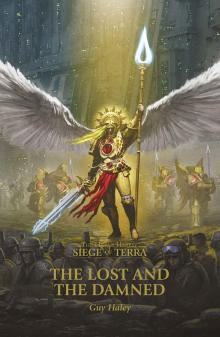 The Lost and the Damned (The Horus Heresy Siege of Terra Book 2)
The Lost and the Damned (The Horus Heresy Siege of Terra Book 2)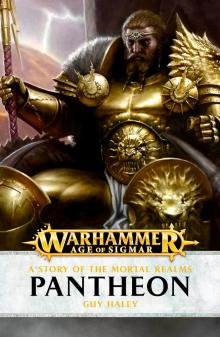 Pantheon
Pantheon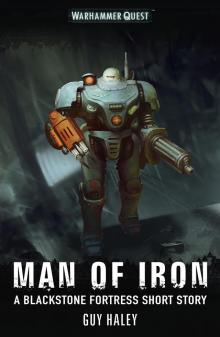 Man of Iron
Man of Iron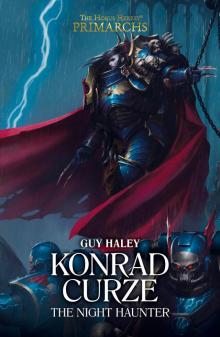 Konrad Curze the Night Haunter
Konrad Curze the Night Haunter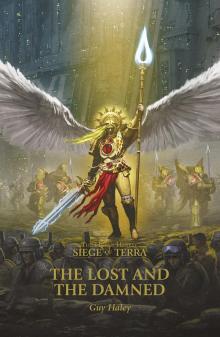 The Lost and the Damned
The Lost and the Damned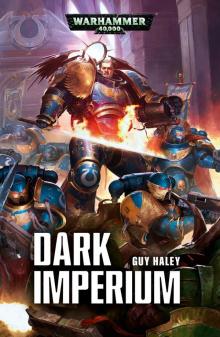 Dark Imperium
Dark Imperium Hoppo's Pies
Hoppo's Pies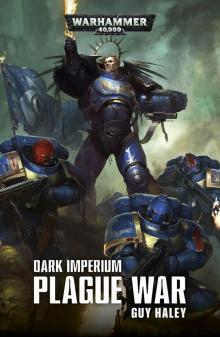 Dark Imperium: Plague War
Dark Imperium: Plague War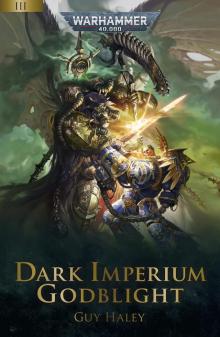 Dark Imperium: Godblight
Dark Imperium: Godblight Crash
Crash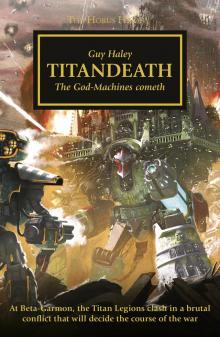 Titandeath
Titandeath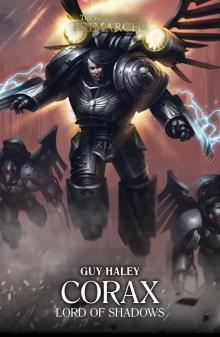 Corax- Lord of Shadows
Corax- Lord of Shadows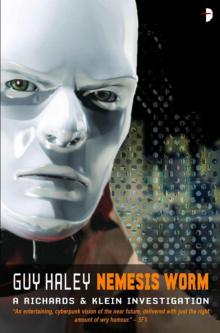 The Nemesis Worm
The Nemesis Worm Wolfsbane
Wolfsbane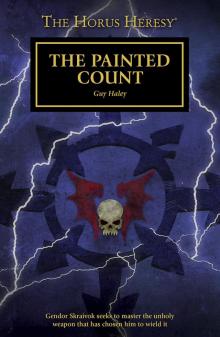 The Painted Count
The Painted Count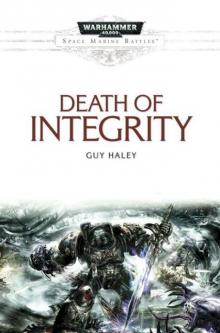 The Death of Integrity
The Death of Integrity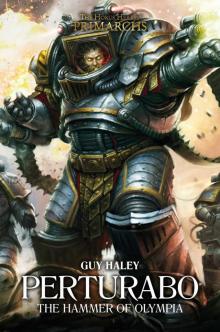 Perturabo: Hammer of Olympia
Perturabo: Hammer of Olympia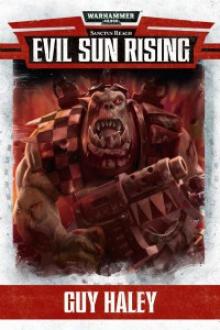 Evil Sun Rising
Evil Sun Rising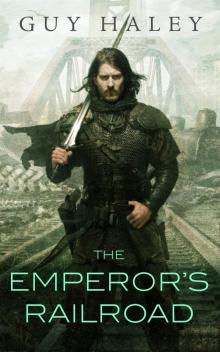 The Emperor's Railroad
The Emperor's Railroad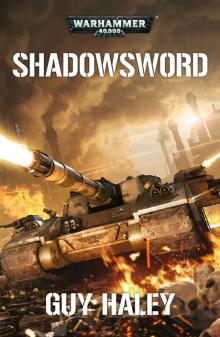 Shadowsword
Shadowsword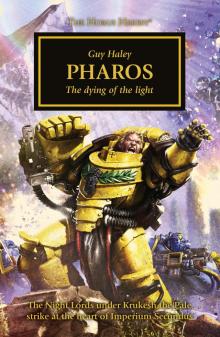 Pharos
Pharos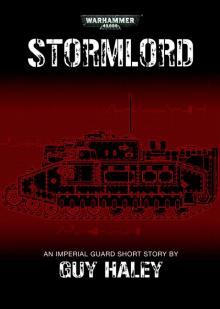 Stormlord
Stormlord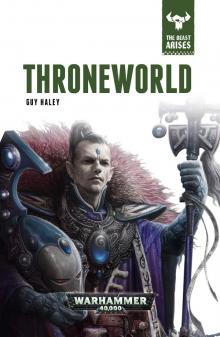 Throneworld
Throneworld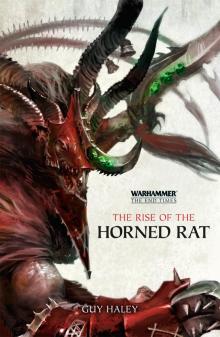 The End Times | The Rise of the Horned Rat
The End Times | The Rise of the Horned Rat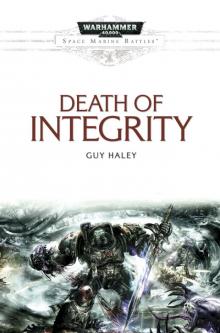 Death of Integrity
Death of Integrity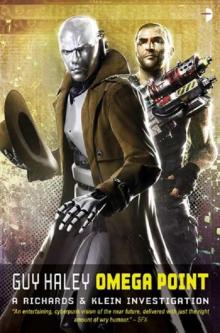 Omega Point
Omega Point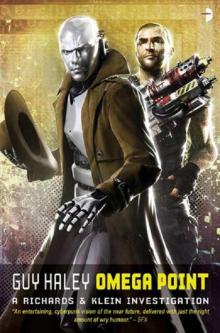 Omega point rak-2
Omega point rak-2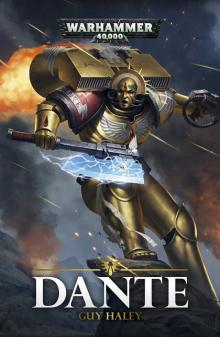 Dante
Dante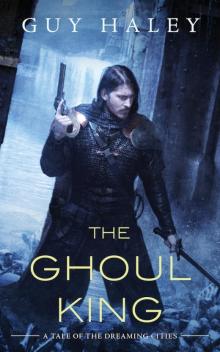 The Ghoul King
The Ghoul King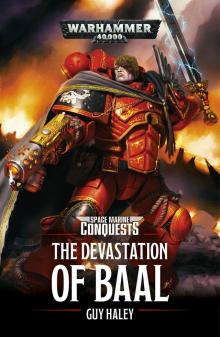 The Devastation of Baal
The Devastation of Baal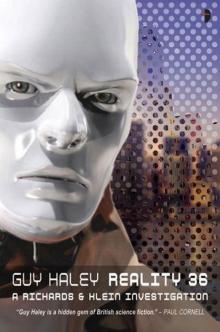 Reality 36: A Richards & Klein Novel
Reality 36: A Richards & Klein Novel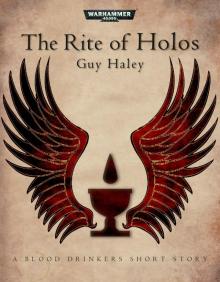 The Rite of Holos
The Rite of Holos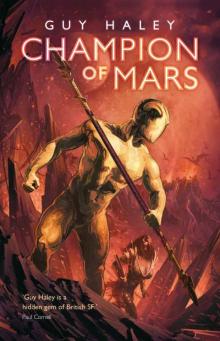 Champion of Mars
Champion of Mars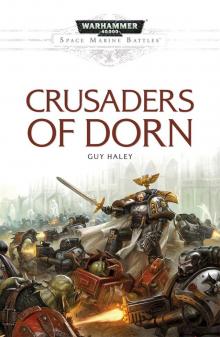 Crusaders of Dorn
Crusaders of Dorn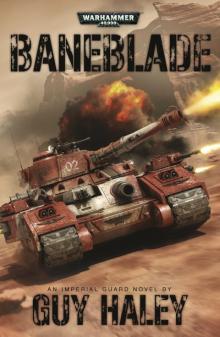 Baneblade
Baneblade